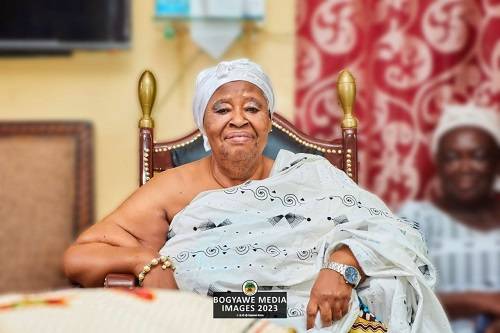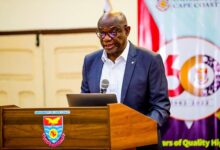
The Queen Mother of Akwamu Traditional Area, Nana Afrakoma II, has called for increased support for adolescent mothers to enable them rebuild their lives for the better.
According to her, despite their poor decisions which had made them mothers at an early age, it was critical that such adolescents were given support to improve their wellbeing to avoid becoming a burden on society.
She explained that, the society had a duty to collectively help adolescent mothers rethink and reshape their lives to contribute to national development.
Nana Afrakoma II, one of the longest serving paramount queen mothers in the country, was speaking to the Ghanaian Times ahead of the maiden graduation ceremony of adolescent mothers who were enrolled at the Nana Afrakoma II Vocational Training Institute at Akwamufie in the Asuogyaman District of the Eastern Region.
Founded by the queen mother in 2021, the institute was established with the objective of providing employable s¢kills such as beads making, hairdressing and fashion designing to needy adolescent mothers in the Akwamu Traditional Area and adjoining communities.
It has a current students population of 30 girls, with 12 of them scheduled for graduation this weekend.
“The core idea is giving value and hope to adolescent mothers who dropped out of school and could not continue, due to financial challenges and societal stigma,” Nana Afrakoma stated.
Since assuming the role of queen mother in 1964 at age 18, she noted that it was her dream to empower needy young people in the area through skills development and training.
Through her foundation, Ohemea Afrakoma II Foundation, she said the Akwamu paramountcy had intensified sensitisation on teenage pregnancy in the area to tackle the menace.
She said, the rising cases of teenage pregnancy in the area, had resulted in increased school dropouts, hence the decision to train the beneficiaries to be able to care for their wards.
“Our interests now is providing young women who had dropped out of school due to pregnancy, with employable skills and a means to improve their livelihood.
We have within the past two years, enrolled 30 students in the institute at no cost. The 12, who have completed the training would be graduating on November 25,” Nana Afrakoma noted.
She said although the institute was initially established to provide free skills training for the indigenes of Akwamu, including Senchi, Atimpoku and others, it was currently doing same for others from the neighbouring communities.
In addition to the training, she noted that the graduates would be supported with start-up capital to enable them commence their business operations.
Currently, the school is solely funded by the Ohemea Afrakoma II Foundation with support from the Odeneho Kwafo Akoto Education Fund, United Nations Population Fund (UNFPA), and other charity and corporate organisations as well as benevolent individuals.
“We are grateful to the Akwamu Paramountcy for the continuous support as well as the UNFPA which has taken a genuine interest in what we do here.
The Asuogyaman District Assembly has also donated a four classroom block to be used as one of our training centres. So yes, despite the financial burden, the support from everyone, including voluntary donors have made it possible for the school’s survival,” Nana Afrakoma added.
She said, in addition to providing the young people with training on employable skills, sensitisation on the dangers of teenage pregnancy had been heightened to prevent others from going through similar experiences.
The queen mother said the institute was looking for a partner to develop its 30 acre land to be able to expand and admit more young people who have interest in pursuing any of the skills development programmes.
Odeneho Kwafo Akoto lll, Omanhene of the Akwamu Traditional Area, who is the pillar behind the project, reiterated the Paramountcy’s commitment to providing the needed support to enable the institute train more young people to enhance their wellbeing.
BY CLAUDE NYARKO ADAMS






